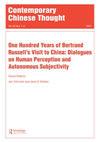羞耻的现象学分析
IF 0.4
3区 哲学
0 ASIAN STUDIES
引用次数: 0
摘要
编者按:本文从现象学的角度分析了中国的几个“耻”概念——尴尬(秀)、懊恼(丑)、耻(丑)、耻(丑)。它详细阐述了它们的结构联系和相关经验,特别是关于人际关系条件和情感或身体反应。陈关注的是道德羞耻感的概念,它与儒家传统的联系,以及由于思想和技术环境,如个人自我意识的增强和互联网文化的蓬勃发展,它在当今社会的弱化。本文章由计算机程序翻译,如有差异,请以英文原文为准。
A Phenomenological Analysis of Shame
EDITOR’S ABSTRACT This article presents a phenomenological analysis of several Chinese notions of shame—embarrassment (xiu), chagrin (kui), shame (chi), and disgrace (ru). It elaborates on their structural connections and related experiences, more particularly concerning interpersonal conditions and emotional or physical reactions. Chen focuses on the notion of moral shame, its connection to the Confucian tradition, and its weakening in the current society, due to ideational and technical circumstances, such as the increased sense of individual self and the booming of internet culture.
求助全文
通过发布文献求助,成功后即可免费获取论文全文。
去求助
来源期刊

CONTEMPORARY CHINESE THOUGHT
Multiple-
CiteScore
0.10
自引率
0.00%
发文量
0
期刊介绍:
This wide ranging journal is essential reading for anyone who wants to understand the diverse themes and influences that shape Chinese thought today. It features translations of the most current and influential Chinese writings on all aspects of philosophical endeavor, from theoretical essays on systems to studies of China"s cultural and religious development, from interpretations of the Chinese classics to exegeses on Marxist thought.
 求助内容:
求助内容: 应助结果提醒方式:
应助结果提醒方式:


